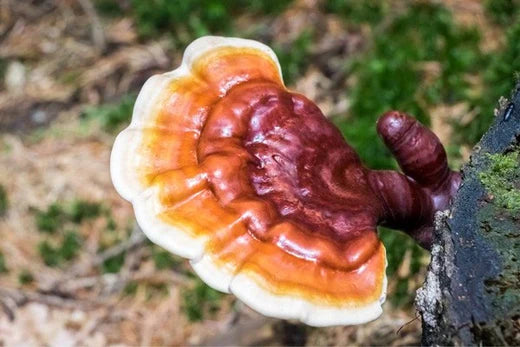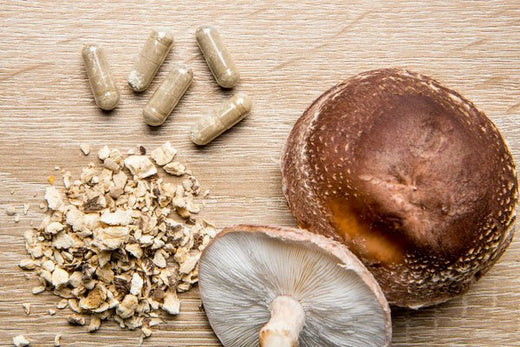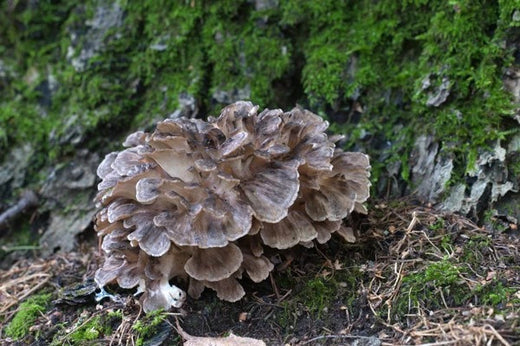Chaga Mushroom Tea: A Detailed Explanation

Introduction:
Chaga mushroom, scientifically known as Inonotus obliquus, holds great significance in traditional folk medicine across Russia, Northern Europe, and China. Revered as the "King of Mushrooms," it boasts exceptional antioxidant properties and offers various health benefits such as improved cardiovascular health, skin health, gut health, immunity, liver function, and enhanced adaptability and stress relief.
In recent times, Chaga has garnered attention for its anti-aging effects, ability to enhance cholesterol and blood glucose levels, and its immune-modulating benefits against cancer.
What sets Chaga mushroom apart is its unique growth on living birch trees, forming a symbiotic relationship with the tree. This interaction with the medicinal birch tree enables Chaga to possess potent medicinal properties. Despite being referred to as a "mushroom," it is actually a sclerotia, a mycelial mass primarily composed of medicinal compounds derived from birch trees such as betulin, betulinic acid, and more.
As an adaptogenic herb, Chaga supports the hypothalamic-pituitary-adrenal (HPA) axis, which connects our brain, perceived stressors, and the release of stress hormones from the adrenals.
For generations, Chaga mushrooms have been used to create health-promoting tea that offers remarkable benefits for individuals of all ages. In the following sections, we will provide comprehensive information about the incredibly healthy Chaga tea.
Table of Contents
-
What is the Taste of Chaga Tea?
-
The Popularity of Chaga Mushroom Beverages
-
1. Abundant in Antioxidants
-
2. Potential Immune System Enhancement
-
3. Potential Cholesterol-Lowering Benefits
-
4. Potential Blood Sugar Regulation
-
Frequently Asked Questions
-
How to prepare Chaga mushroom tea with Teelixir?
-
Is Chaga mushroom tea beneficial for your health?
-
Are there any adverse effects of Chaga tea?
-
How frequently should you drink Chaga tea?
-
To Sum Up
-
References
What is the Taste of Chaga Tea?
Chaga mushrooms have a distinct taste that sets them apart from the typical culinary mushrooms found in supermarkets and grocery stores.
Healthy Chaga tea offers an earthy flavour with a natural bitterness resulting from its high content of triterpenoid compounds. Additionally, Chaga tea contains a naturally occurring form of vanillin, the same compound found in vanilla beans, which lends a pleasant vanilla taste to the tea.
Many individuals are accustomed to enjoying sweet and salty foods and may not have developed a taste for bitter flavours yet. Consequently, people often approach Chaga's bitter earthy taste with caution, prompting the common question, "What does Chaga tea taste like?"
While it is possible to consume Chaga tea as is, it may not appeal to most due to its slight bitterness. Adding your preferred sweetener or plant-based milk can enhance its palatability and improve the taste.
The Popularity of Chaga Mushroom Beverages
Chaga mushroom beverages have gained popularity for centuries in folk medicine. In historical context, the Finnish army turned to Chaga as a coffee substitute during WWII when coffee beans became scarce.
In modern times, Chaga mushroom extract has become popular as an addition to coffee or as a suitable alternative to coffee.
Chaga stimulates cellular energy production in the body without causing excessive stimulation of the nervous system, similar to the effects of coffee. By incorporating Chaga into your coffee, you can experience sustained energy throughout the day. Furthermore, coffee is known to be acidic in the body, but when Chaga is added, it helps balance the acid-alkaline ratio, making your cup of coffee less acidic.
Consider trying a superfood latte infused with Chaga to explore its unique flavor.
Chaga is naturally caffeine-free, and its potent energy-enhancing benefits make it an excellent replacement for coffee. Unlike coffee, which can cause jitters and unwanted crashes, especially when consumed in excess, Chaga provides sustained energy without those adverse effects.
Wild Chaga extract derived from birch trees is a versatile ingredient that adds a delightful touch to smoothies, hot chocolates, soup broths, and various other recipes."

1. Abundant in Antioxidants
Chaga possesses an impressive concentration of antioxidants, making it one of the most potent sources worldwide. Wild Chaga mushrooms have an ORAC (Oxygen Radical Absorbance Capacity) value of approximately 146,700, which is three times higher than the widely popular antioxidant-rich acai berry.
This signifies that Chaga is highly effective in eliminating harmful free radicals that contribute to oxidative stress, which can damage cellular DNA and impair cell function. It emphasises the importance of incorporating antioxidant-rich foods into our daily diet to maintain a balance between pro-oxidants and antioxidants.
Chaga mushrooms are rich in polyphenols, particularly inonoblins, protocatechic acid, and gallic acid. These polyphenolic compounds have been scientifically proven to enhance the body's production of its own protective endogenous antioxidants, such as Glutathione, Superoxide Dismutase (SOD), and Catalase.
The body naturally generates free radicals as part of its regular cellular activities. Energy production, detoxification processes, and immune system responses all involve the production of free radicals. However, external factors like harmful toxins (e.g., cigarette smoke, inflammatory junk foods), chronic stress, and lack of sleep can increase free radical production, leading to accelerated cellular ageing and the development of diseases.
By regularly consuming antioxidant-rich foods like Chaga mushrooms, the body becomes more resilient and better equipped to counteract the oxidative stress caused by both internal and external sources. This, in turn, improves the structure and function of our cells, ultimately benefiting our overall well-being.
Chaga mushrooms are also notable for their melanin content, which is responsible for determining skin colour. Melanin itself acts as an antioxidant compound and possesses protective properties for our genes.
2. Potential Immune System Enhancement
Traditionally, Chaga, like other medicinal mushrooms, has been used to support the body's immune system and mitigate the effects of stress.
Chaga specifically aids the immune system due to its abundant polysaccharides and triterpenoids. It contains beta-glucans and proteoglycans that have been shown to stimulate and activate natural killer (NK) cells, crucial components of the innate immune response.
NK cells are the first responders to harmful foreign agents detected in the body. They trigger the migration of T-cells and macrophages to the affected areas, initiating an immune response that leads to the elimination of the invader.
Chaga mushrooms also promote apoptosis, which refers to programmed cell death.
Apoptosis is a necessary process for maintaining healthy cell function. When cells malfunction or become infected with viral DNA, they release free radicals and contribute to the mutation of cancer cells. Chaga also possesses anti-cancer properties.
Apoptosis serves as a crucial mechanism for cleansing the entire body. It identifies old or damaged cells and activates the immune system to eliminate and remove them.
3. Potential Cholesterol-Lowering Benefits
For centuries, Chaga has been recognised for its hypocholesterolemic properties and its ability to protect the liver. In studies conducted on mice, Chaga consumption demonstrated a significant reduction in LDL cholesterol, free fatty acids, total cholesterol, and triglyceride levels, accompanied by an increase in HDL cholesterol.
Chaga mushrooms are also rich in chitin, an insoluble fibre found in their cell walls.
Fiber plays a key role in lowering cholesterol by binding to excess cholesterol in the gastrointestinal tract, facilitating its excretion through the bowels. Additionally, liver function is closely tied to cholesterol levels. One of the liver's primary functions is recycling and transporting cholesterol. When the liver becomes overwhelmed, its ability to process cholesterol is compromised, leading to inflammation and high cholesterol levels.
Chaga mushrooms are hepatoprotective, meaning they protect and support the liver against oxidative stress while stimulating the production of endogenous antioxidant compounds such as Glutathione, SOD (superoxide dismutase), and catalase, ultimately resulting in lower cholesterol levels.
4. Potential Blood Sugar Regulation
Chaga contains triterpenoid compounds that have been shown to help regulate blood sugar levels. Betulinic acid, betulin, ergosterol, lanosterol, inotodiol, and trametonolic acid all contribute to its blood-glucose lowering benefits.
Numerous studies have demonstrated the effectiveness of Chaga mushrooms in significantly reducing blood glucose levels and improving glucose tolerance in induced diabetic mice when administered over a three-week period.
Chaga has also been found to improve blood glucose balance through its antioxidant properties and its ability to inhibit the formation of advanced glycation end products (AGEs) .
AGEs occur when glucose in the bloodstream binds to proteins, resulting in increased inflammation, impaired protein function, and accelerated atherosclerosis. This buildup of plaque in the arteries contributes to cardiovascular disease.
Oxidative stress also hinders proper glucose metabolism and insulin sensitivity, leading to elevated blood glucose levels and conditions like pre-diabetes, type 2 diabetes, PCOS, and metabolic diseases.
As an adaptogen and potent antioxidant, Chaga helps to reduce oxidative stress and free radicals, thereby improving and maintaining healthy blood sugar levels.

Frequently Asked Questions
How to prepare Chaga mushroom tea with Teelixir?
The most effective way to enjoy the numerous health benefits of Chaga mushroom is by making Chaga tea following these traditional steps.
To begin, simply combine ½ tsp (1-3 grams) of Chaga mushroom extract powder with a cup of boiling water. For the best outcome, we suggest drinking Chaga tea on its own. However, if the taste is not appealing, you can enhance it by adding your preferred sweetener and/or plant-based milk. Once the temperature is suitable, savor the tea and enjoy its goodness.
Experience the wonders of wild Chaga mushroom today.
Is Chaga mushroom tea beneficial for your health?
Chaga mushroom tea ranks among the most potent and advantageous teas worldwide. For centuries, Chaga tea has been celebrated as a life-enhancing elixir.
When you consume Chaga tea, your body absorbs the powerful adaptogenic triterpenoids, immune-modulating polysaccharides, DNA-supporting antioxidants, and polyphenols present in the mushroom. These compounds promptly take effect in boosting the immune system, increasing energy levels, reducing stress, nourishing the skin, improving cardiovascular health, and promoting overall well-being.
Are there any adverse effects of Chaga tea?
For healthy individuals, there is no evidence to suggest any side effects from consuming Chaga. However, it is advisable to consult your medical practitioner if you have any underlying medical conditions or concerns before incorporating Chaga into your routine.
Due to limited human studies and clinical evidence, it is recommended to refrain from consuming Chaga mushroom while pregnant or breastfeeding.
Individuals with autoimmune conditions should exercise caution, as well as those taking blood sugar and cholesterol-lowering medications, as Chaga may have an additive effect.
Individuals with bleeding disorders or those preparing for surgery should avoid consuming Chaga.

How frequently should you drink Chaga tea?
As a highly esteemed adaptogen and tonic herb, Chaga tea can be safely consumed in moderate amounts on a daily basis. If you are new to Chaga, start with one cup per day and observe how your body responds. Gradually increase the intake over time, aiming for three cups per day or more to maximise the health benefits.
To Sum Up
Chaga mushroom holds a prominent position as a potent source of antioxidants and cellular protection in the realm of food. Recognised as a highly beneficial 'functional food', Chaga mushrooms have been extensively documented in ancient and traditional medicinal texts for their health benefits and therapeutic applications. Throughout centuries, Chaga has been employed to enhance digestive well-being, promote skin nourishment, aid liver and cardiovascular health, bolster immunity, and act as an exceptional longevity agent, extending lifespan.
Incorporating regular consumption of Chaga tea into your daily routine allows you to harness the remarkable medicinal properties it offers, thereby supporting your overall well-being and health.
References
RAC Values: Antioxidant Values of Foods & Beverages - https://www.superfoodly.com/orac-values/
Shikov. Et al. 2014. Medicinal Plants of the Russian Pharmacopoeia; their history and applications. https://doi.org/10.1016/j.jep.2014.04.007
Wasser, SP. 2002. Medicinal mushrooms as a source of antitumor and immunomodulating polysaccharides. DOI 10.1007/s00253-002-1076-7
Powell, Martin. Medicinal Mushrooms - A Clinical Guide
A Critical Review on Health Promoting Benefits of Edible Mushrooms through Gut Microbiota - https://www.ncbi.nlm.nih.gov/pmc/articles/PMC5618583/
Anti-allergic effect of inotodiol, a lanostane triterpenoid from Chaga mushroom, via selective inhibition of mast cell function - https://www.sciencedirect.com/science/article/pii/S1567576919326608
Antihyperglycemic and Antilipidperoxidative Effects of Polysaccharides Extracted from Medicinal Mushroom Chaga, Inonotus obliquus (Pers.: Fr.) Pilát (Aphyllophoromycetideae) on Alloxan-Diabetes Mice -
https://www.sciencedirect.com/science/article/pii/S0378874108001086
Medicinal mushrooms as a new source of natural therapeutic bioactive compounds - https://www.researchgate.net/publication/334152059_Medicinal_mushrooms_as_a_new_source_of_natural_therapeutic_bioactive_compounds
Effects of polysaccharides from Inonotus obliquus and its chromium (III) complex on advanced glycation end-products formation, α-amylase, α-glucosidase activity and H2O2-induced oxidative damage in hepatic L02 cells -
https://www.sciencedirect.com/science/article/pii/S0278691518302618
Phytochemical characteristics and hypoglycaemic activity of fraction from mushroom Inonotus obliquus - https://onlinelibrary.wiley.com/doi/abs/10.1002/jsfa.3809
Anti-diabetic effects of Inonotus obliquus polysaccharides in streptozotocin-induced type 2 diabetic mice and potential mechanism via PI3K-Akt signal pathway -
https://www.sciencedirect.com/science/article/pii/S0753332217319637
Effect of the Inonotus Obliquus Polysaccharides on Blood Lipid Metabolism and Oxidative Stress of Rats Fed High-Fat Diet In Vivo - https://ieeexplore.ieee.org/abstract/document/5305591
Natural Medicines – Chaga Mushroom - https://naturalmedicines.therapeuticresearch.com/





